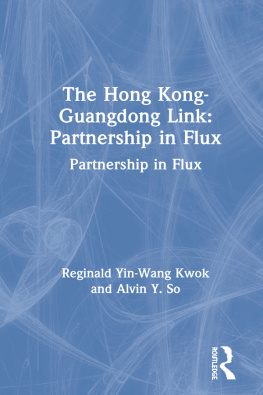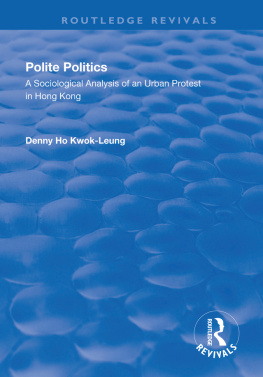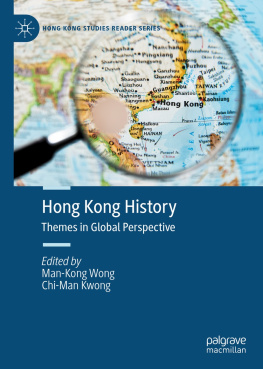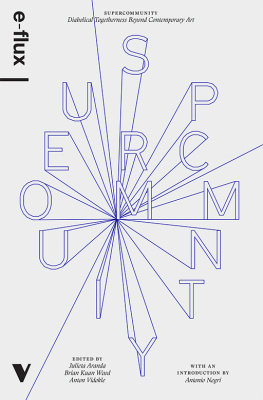The Hong Kong-Guangdong Link Hong Kong Becoming China: The Transition to 1997 Ming K. Chan and Gerard A. Postiglione Series General Editors Because of Hong Kongs remarkable development under British rule for the past 150 years and its contemporary importance as a world economic and communications center on the Pacific Rim, and due to Hong Kongs future status as a Special Administrative Region of the Peoples Republic of China from 1997 well into the mid-twenty-first century, M.E. Sharpe has inaugurated this new multi-volume series. Published for an international readership, this series aims at providing both expert analysis and the documentary basis for a more informed understanding of Hong Kongs transition as a free society and capitalist economy toward socialist Chinese sovereignty under the One Country, Two Systems formula. This series explores various crucial dimensions of Hong Kongs current development in this transition process and their implications for the international community. Individual volumes in this series will focus on key areas and issues ranging from Chinas Basic Law for Hong Kong, education and social change, the existing common law legal system, the historical relationship between Britain, China, and Hong Kong, urban growth and infrastructural development, the control of the media, social movements and popular mobilization, the cultural identity of Hong Kong Chinese, to economic linkages with mainland China, the Beijing-Hong KongTaipei triangle, brain drain and migration overseas, as well as the internationalization of Hong Kong. The books in this series so far are: The Hong Kong Basic Law: Blueprint for Stability and Prosperityunder Chinese Sovereignty? edited by Ming K. Chan and David Clark; Education and Society in Hong Kong: Toward One Country and Two Systems, edited by Gerard A. Postiglione; The Common Law System in Chinese Context: Hong Kong in Transition, by Berry Hsu; Precarious Balance: Hong Kong between China and Britain, 18421992, edited by Ming K. Chan; Reluctant Exiles? Migration from Hong Kong and the New Overseas Chinese, edited by Ronald Skeldon; and The Hong Kong-Guangdong Link: Partnership in Flux, edited by Reginald Yin-Wang Kwok and Alvin Y. So. Ming K. Chan is a member of the History Department, University of Hong Kong, and Executive Coordinator of the Hong Kong Documentary Archives, Hoover Institution, Stanford University. Gerard A. Postiglione is Senior Lecturer in Sociology of Education, University of Hong Kong, and Director of its Education and National Integration Program. First published 1995 by M.E. Sharpe Published 2015 by Routledge 2 Park Square, Milton Park, Abingdon, Oxon OX14 4RN 711 Third Avenue, New York, NY 10017, USA Routledge is an imprint of the Taylor & Francis Group, an informa business Copyright 1995 Taylor & Francis. All rights reserved. No part of this book may be reprinted or reproduced or utilised in any form or by any electronic, mechanical, or other means, now known or hereafter invented, including photocopying and recording, or in any information storage or retrieval system, without permission in writing from the publishers. Notices No responsibility is assumed by the publisher for any injury and/or damage to persons or property as a matter of products liability, negligence or otherwise, or from any use of operation of any methods, products, instructions or ideas contained in the material herein. Practitioners and researchers must always rely on their own experience and knowledge in evaluating and using any information, methods, compounds, or experiments described herein. In using such information or methods they should be mindful of their own safety and the safety of others, including parties for whom they have a professional responsibility. Product or corporate names may be trademarks or registered trademarks, and are used only for identification and explanation without intent to infringe. Library of Congress Cataloging-in-Publication Data The Hong Kong-Guangdong Link: Partnership in Flux / Reginald Yin-Wang Kwok and Alvin Y. So, editors. p. cm.(Hong Kong becoming China: the transition to 1997) An East Gate book. Includes bibliographical references and index. ISBN 1-56324-620-1 (hardcover: alk. paper) 1. Hong KongEconomic conditions. 2. Hong KongPolitics and government. 3. Kwangtung Province (China)Economic conditions. 1. Kwok, R. Yin-Wang. II. So, Alvin Y., 1953- III. Series: Hong Kong becoming China. HC470.3.H666 1995 337.5125051 275dc20 95-15378 CIP ISBN 13: 9781563246203 (hbk) Contents Reginald Yin-Wang Kwok and Roger T. Ames Ming K. Chan Graham E. Johnson Gregory Eliyu Guldin Ming-kwan Lee Xueqiang Xu, Reginald Yin-Wang Kwok, Lixun Li, and Xiaopei Yan Victor F. S. Sit Ian Scott Yun-wing Sung Alvin Y. So and Reginald Yin-Wang Kwok Alvin Y. So and Reginald Yin-Wang Kwok | Roger T. Ames | Department of Philosophy, University of Hawaii at Manoa. | | Ming K. Chan | Department of History, University of Hong Kong. Hong Kong Documentary Archives, Hoover Institution, Stanford University. | | Gregory Guldin | Department of Anthropology, Pacific Lutheran University. | | Graham Johnson | Department of Anthropology and Sociology, University of British Columbia. | | Reginald Yin-Wang Kwok | Asian Studies Programs, and Department of Urban and Regional Planning, University of Hawaii at Manoa. | | Ming-kwan Lee | Department of Applied Social Studies, Hong Kong Polytechnic University. | | Lixun Li | Centre for Urban and Regional Studies, Zhongshan University. | | Alvin Y. So | Department of Sociology, University of Hawaii at Manoa. | | Ian Scott | School of Social Sciences, Murdoch University. | | Victor Sit | Department of Geography and Geology, University of Hong Kong | | Xiaopei Yan | Centre for Urban and Regional Studies, Zhongshan University. | | Yun-Wing Sung | Department of Economics, Chinese University of Hong Kong. | | Xueqiang Xu | Centre for Urban and Regional Studies, Zhongshan University. |
Indeed, Hong Kong has little future without Guangdong. The days when Guangdong was considered Hong Kongs hinterland of farms and fields are long over. Economic reforms have transformed South China. This has had an enormous impact on Hong Kong, which has moved much of its manufacturing over the border and now employs more than three million industrial workers in Guangdong. This is contributing to a Manhattan-ization of Hong Kong. Yet, Guangdongs economy still pales in comparison to that of Hong Kong. With a tenth of the population of Guangdong, Hong Kong is the worlds eighth largest trading economy. Does the Hong Kong tail wag the Guangdong dog? Or will Hong Kong soon be swallowed up by Guangdong? The plot thickens as four new international airports all within a radius of fifty miles in the southern tip of the Pearl River Delta, one each in Hong Kong and Macau and one in each of Chinas Special Economic Zones, Shenzhen and Zhuhai, compete with one another. But make no mistake about it, behind Guangdongs dependency on Hong Kong is, in fact, a growing dependency on the world economy. This will continue to be the case, though in the process, Hong Kongs growing dependency on Guangdong may reshape its own internationalism. | Next page











